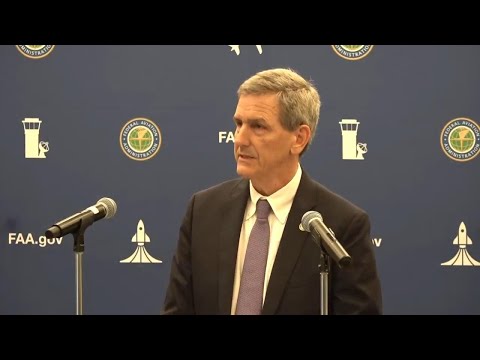(30 May 2024)
RESTRICTION SUMMARY:
ASSOCIATED PRESS
Washington DC – 30 May 2024
1. SOUNDBITE (English) Mike Whitaker, FAA Administrator:
"First and foremost, Boeing is now required to have a mandatory safety management system, which will ensure a structured, repeatable, systematic approach to identify hazards and manage risk. They have also committed to increasing employee training and communication, strengthening the anonymous reporting system that employees can use without fear of reprisal, boosting supplier oversight, making sure that things happen in the right sequence at every step of production, and getting more input from users of the system, including including pilots."
++SEPARATED BY WHITE FLASH++
2. SOUNDBITE (English) Mike Whitaker, FAA Administrator:
"The FAA will provide oversight, oversight at every step of the way in this process. We certify every 737 max before it can be put into service, and we will continue to do so. We will also provide enhanced oversight of Boeing and its suppliers. Practically speaking, this means more safety inspectors in the Boeing and Spirit facilities, more feedback from company employees to gauge the effectiveness of change, additional inspections at critical points of the production process and monitoring metrics to identify areas of concern. Safety is a team sport. Everyone has a role to play. Boeing must do their part and we will be there to make sure they do that."
++SEPARATED BY WHITE FLASH++
3 . SOUNDBITE (English) Mike Whitaker, FAA Administrator:
"So there’s no goal. There’s no timeline. What this plan does is it includes a series of initiatives, programs for change management throughout the company. And it also includes six very distinctive key performance metrics that we’ll be able to monitor in real time."
++ENDS ON SOUNDBITE++
STORYLINE:
FAA Administrator Mike Whitaker says Boeing submitted plans to fix the safety and quality problems that have plagued its aircraft-manufacturing work in recent years.
"The FAA will provide oversight, oversight at every step of the way in this process, we certify every 737 max before it can be put into service, and we will continue to do so," said Whitaker.
"Safety is a team sport. Everyone has a role to play. Boeing must do their part and we will be there to make sure they do that."
The Federal Aviation Administration required the company to produce a turnaround plan after one of its jetliners suffered a blowout of a fuselage panel during an Alaska Airlines flight in January.
In late February, Whitaker gave Boeing 90 days to come up with a plan to improve quality and ease the agency’s safety concerns.
Nobody was hurt during January’s incident on a relatively new Boeing 737 Max 9 as the plane flew above Oregon.
Accident investigators determined that bolts that helped secure the panel to the frame of the plane were missing before the piece blew off. The mishap has further battered Boeing’s reputation and led to multiple civil and criminal investigations.
The FAA limited Boeing production of the 737 Max, its best-selling plane, after the close call involving the Alaska Airlines jetliner. Whitaker said the cap will remain in place until his agency is satisfied Boeing is making progress.
Boeing’s recent problems could expose it to criminal prosecution related to the deadly crashes of two Max jetliners in 2018 and 2019.
Whistleblowers have accused the company of taking shortcuts that endanger passengers, a claim that Boeing disputes. A panel convened by the FAA prior to the blowout found shortcomings in the aircraft maker’s safety culture.
Find out more about AP Archive: http://www.aparchive.com/HowWeWork
Twitter: https://twitter.com/AP_Archive
Facebook: https://www.facebook.com/APArchives
Instagram: https://www.instagram.com/APNews/
You can license this story through AP Archive: http://www.aparchive.com/metadata/youtube/ed3ae45ac0384268bfb8882a89b87a12





